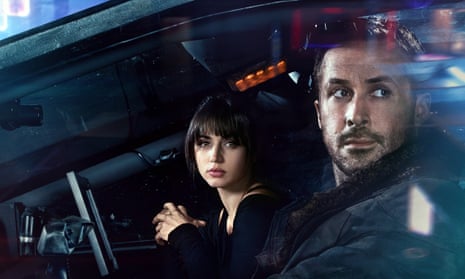It boasted an all-star cast and was touted as a future classic by critics, but Blade Runner 2049 has failed to live up to lofty expectations at the US box office, making substantially less than expected in ticket sales. The big-budget sequel to the seminal 1982 sci-fi movie took $31.5m on its opening weekend, a significantly lower figure than the $45m to $50m figure projected by its studio Warner Bros. The film, which is directed by Canadian film-maker Denis Villeneuve, is estimated to have cost over $150m to make.
“I’m disappointed we didn’t have a larger result this weekend on behalf of the owners of the film, Alcon,” said Jeff Goldstein, president of domestic distribution for Warner Bros. “We had bigger expectations for the weekend. The tracking and the advance sales indicated that there would be a stronger number.”
Hollywood analysts have suggested that the film’s struggles were a result of its inability to attract women and younger viewers: 71% of the audience for 2049, which stars Ryan Gosling and Harrison Ford, was male and 86% of it was over 25. Other factors that may contributed to its failure include a lengthy run time of 163 minutes, which limited the number of screenings in cinemas, and its dark, adult tone.
“It’s an intellectually charged, apocalyptic sci-fi story. It’s not Close Encounters, it’s not Star Wars. It’s a challenging film. To me, those are the best type of films,” said Paul Dergarabedian, senior media analyst at comScore. “But does it make it the most commercial? No. It was creatively and thematically perfectly executed … but it didn’t play to the numbers everyone thought.”
Despite Blade Runner 2049’s disappointing numbers, it was still the most popular movie of the weekend with US audiences, taking over $20m more than Idris Elba and Kate Winslet’s romantic drama The Mountain Between Us, which debuted at No 2. The horror film It followed in third place with $9.7m in its fifth week. The Stephen King adaptation has earned a total of $603.7m worldwide.
Warner Bros could also take heart from Blade Runner 2049’s robust performance at the international box office, where it earned $50.2m in 63 markets, according to Screen International. The film topped the chart in 45 countries, including Russia, Australia, Germany and the UK, where it earned more than £6m.
Warner Bros are hopeful that Oscars buzz and strong word-of-mouth can help Blade Runner 2049 to find a wider audience over the coming months. The film has received an impressive A minus rating with Cinemascore, which measures audience reactions to films. “We are optimistic that Blade Runner 2049 will find a broader audience over the next weeks and months,” Goldstein said.

Comments (…)
Sign in or create your Guardian account to join the discussion